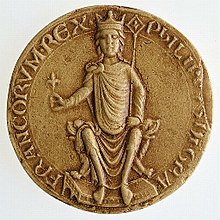Philip II of France
King of France from 1180 to 1223 / From Wikipedia, the free encyclopedia
Dear Wikiwand AI, let's keep it short by simply answering these key questions:
Can you list the top facts and stats about Philip II of France?
Summarize this article for a 10 years old
Philip II (21 August 1165 – 14 July 1223), byname Philip Augustus (French: Philippe II Auguste), was King of France from 1180 to 1223. His predecessors had been known as kings of the Franks, but from 1190 onward, Philip became the first French monarch to style himself "King of France" (Latin: rex Francie).[lower-alpha 2] The son of King Louis VII and his third wife, Adela of Champagne, he was originally nicknamed Dieudonné (God-given) because he was a first son and born late in his father's life. Philip was given the epithet "Augustus" by the chronicler Rigord for having extended the crown lands of France so remarkably.
| Philip II | |
|---|---|
 Seal of Philip II marked PHILIPPVS DEI GRATIA FRANCORUM REX (Philip, by the Grace of God, King of the Franks), 1180 | |
| King of the Franks/France[lower-alpha 1] (more...) | |
| Senior king | 18 September 1180 – 14 July 1223 |
| Junior king | 1 November 1179 – 18 September 1180 |
| Coronation | 1 November 1179 |
| Predecessor | Louis VII |
| Successor | Louis VIII |
| Born | 21 August 1165 Gonesse, France |
| Died | 14 July 1223(1223-07-14) (aged 57) Mantes-la-Jolie, France |
| Burial | |
| Spouse | Isabella of Hainault (m. 1180, d. 1190) Ingeborg of Denmark (m. 1193 & 1201, wid. 1223) Agnes of Merania (m. 1196, an. 1201) |
| Issue more... | |
| House | Capet |
| Father | Louis VII of France |
| Mother | Adela of Champagne |
After decades of conflicts with the House of Plantagenet, Philip succeeded in putting an end to the Angevin Empire by defeating a coalition of his rivals at the Battle of Bouvines in 1214. This victory would have a lasting impact on western European politics: the authority of the French king became unchallenged, while the English King John was forced by his barons to assent to Magna Carta and deal with a rebellion against him aided by Philip's son Louis, the First Barons' War. The military actions surrounding the Albigensian Crusade helped prepare the expansion of France southward. Philip did not participate directly in these actions, but he allowed his vassals and knights to help carry them out.
Philip transformed France into the most prosperous and powerful country in Europe.[5] He checked the power of the nobles and helped the towns free themselves from seigneurial authority, granting privileges and liberties to the emergent bourgeoisie. He built a great wall around Paris ("the Wall of Philip II Augustus"), re-organized the French government, and brought financial stability to his country.